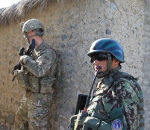The 'Opium Brides' of Afghanistan
Watch Opium Brides on PBS. See more from FRONTLINE.
A 2012 Frontline documentary covered portions of the child slavery trade associated with the opium trade and the Afghan government's selective campaign against opium farming. CNN recently interviewed the filmmakers, who assert that there are "hundreds, if not thousands of girls on the run from the traffickers."
For additional background on the fundamental challenges posed by Afghanistan's opium economy and government drug policy, see Long War Journal coverage from 2010: 'A counterinsurgency conundrum in Salaam Bazaar:'
[P]erhaps a majority of area residents are effectively indentured servants of the Taliban, beholden to insurgent drug lords through the credit system established by the Akhundzada family during their rule of Helmand in the 1980s and 1990s. Farmers receive start-up capital in the form of money, goods, and services that enable them to feed their families while cultivating a poppy crop. After the harvest, the borrowers owe a certain yield to the creditors, regardless of weather, the health of the crop, or other factors. If this debt is not repaid, the farmer falls further into debt or can be subject to beatings and even murder. The locals' resulting servile fear of the Taliban makes cooperation with Americans and the Afghan government security forces an untenable proposition.
Also, 'Prospects for stability in Musa Qala: challenges and possible solutions:'
Despite the risk of incarceration for locals who possess large amounts of the drug, opium cultivation remains a core element of Helmand's cultural and economic fabric. Poppy is relatively inexpensive to grow, in terms of the cost of seed and average crop yields per unit of water and land, and its cultivation has a guaranteed and well-understood net return. In addition, poppy is labor-intensive to harvest, employing large segments of the population; bricks of opium paste can be stored underground for up to five years without spoiling; and it can be used as cash in the local economy. Most crucially, opium farmers gain access to credit.Because of the entrenched financing and trade infrastructure that has grown up around poppy cultivation, small farmers and sharecroppers can easily obtain credit and supplies from merchants, shop owners, and other businessmen, a debt paid back upon successful harvesting and delivery of the yield. This credit can be extended in the form of cash or services and goods, including basic necessities, like food. To an impoverished population often focused on immediate survival, small poppy farming to make ends meet makes sense, despite the illegality, taxation by the Taliban or corrupt government officials, and risk.
The UN has projected that other crops could offer greater profit margins: onions, pomegranates, and almonds are among the alternatives that could promise a higher net income. But despite Afghan government and ISAF programs to jumpstart these crops, the financing options are much more limited, storage and distribution networks are in their infancy or nonexistent, and farmers are skeptical about taking the risk into an unknown market. Many have demanded a guaranteed price for the alternate crops, which is generally considered a non-starter because it will create unsustainable dependencies.
The ties between the insurgency and the opium trade are simple: to the extent the government is unstable, drug lords and the illegal drug trade thrive. And to the extent the local population considers opium cultivation its best or only option, it will hesitate to support any force that threatens its livelihood. Farmers are considered amenable to alternate crops, but some civilian and military experts find that restructuring the local economy away from the drug trade is an intensive, generational aid project. These experts see it as requiring international assistance, especially through the expansion of microloans, the creation of local processing facilities, and widening regional trade with a focus on Afghanistan's neighbors, Pakistan and Iran.

READER COMMENTS: "The 'Opium Brides' of Afghanistan"